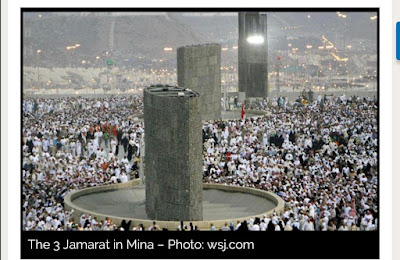When Arafah falls on a Friday, does that mean it is “Hajj Akbar”?
Is this Hajj more virtuous than others?
There is a common *misconception* among people.
They think that if the 9th of Dhul Hijjah falls on a Friday, then it is called a “Hajj-e-Akbar” meaning greater Hajj.
And that this hajj is more “special” and more “virtuous” than Hajj that falls on other days.
Or that this hajj is equivalent to “seven” Hajj or seventy etc.
But that is not true.
There’s no proof of that from the authentic sources.
Actually “Hajj Akbar” is Hajj itself and “Hajj Asghar” is Umrah, according to the majority of the scholars.
Ibn Hajar said:
“The scholars differed in opinion in regard to what is meant by the minor Hajj, and the majority of them are of the view that it is ‘Umrah.
It was also said that the minor Hajj is the day of ‘Arafah and the greater Hajj is the day of Al-Adha [i.e. the day of ‘Eid] as on this day the remaining rituals (of Hajj) are completed…”
Although Hajj on a Friday is *just as virtuous* as Hajj falling on any other day, it is still something GOOD , and SPECIAL when the day of Arafah falls on a Friday,.
Shaykh Ibn ‘Uthaymeen said:
“There is nothing narrated from the Prophet Sal Allaahu Alayhi wa Sallam about there being any special virtue in the Day of ‘Arafah falling on a Friday, but the scholars said that if it happens to fall on a Friday, that is a *good thing*.
As for the commonly-held view that Hajj on a Friday is equivalent to seventy Hajjs, that is not correct.” (Al-Liqa al-Shahriyyah, 34/question no. 18)
Some special virtues of Arafah falling in a Friday:
Ibn al-Qayyim said:
“The correct view is that Friday is the best day of the week and the day of ‘Arafah and the day of Sacrifice are the best days of the year, as are Laylat al-Qadr and the night before Friday.
Hence if the day of ‘Arafah falls on a Friday, it is superior to all the other days in several ways:
1. Coincidence of two days that are the best of days.
2. It is a day in which there is an hour when prayers are answered. Most (scholars) are of the view that it is the last hour after ‘Asr, and the people in the place of standing are all there to offer du’a and beseech Allaah.
3. It falls on the same day that the Messenger of Allaah Sal Allaahu Alayhi wa Sallam did Hajj.
4. People all over the world gather there to listen to the khutbah and pray Jumu’ah, and that coincides with the gathering of the people of ‘Arafah on the day of ‘Arafah in ‘Arafah.
So the Muslims’ gathering in their mosques and their standing to offer du’a and beseech Allaah coincide in a way that does not happen on any other day.
5. Friday is an ‘Eid, and the day of ‘Arafah is an ‘Eid for the people in ‘Arafah, hence it is makrooh for those who are in ‘Arafah to fast on this day.
Ibn Taymiyah said:
The day of ‘Arafah is only an ‘Eid for those who are in ‘Arafah because they are “gathered” there, unlike the people in other regions, who only gather on the Day of Sacrifice.
So it is an ‘Eid for them.
What is meant is that if the day of ‘Arafah falls on a Friday, it is two ‘Eids in one.
6. It coincides with the day when Allaah perfected His religion for His believing slaves and completed His Favor upon them, as it is proven in Saheeh al-Bukhaari that Tariq ibn Shihab said:
“A Jew came to ‘Umar ibn al-Khattab and said:
O Amir al-Muminin, there is an Aayah which you read in your Book; if it had been revealed to us Jews and we knew the day on which it was revealed, we would have taken it as a festival.
He said: Which verse is that?
He said: “This day, I have perfected your religion for you, completed My Favour upon you, and have chosen for you Islam as your religion” [al-Maidah 5:3].
‘Umar ibn al-Khattab said:
“I know the day which it was revealed, and the place in which it was revealed.
It was revealed to the Messenger of Allaah Sal Allaahu Alayhi wa Sallam in ‘Arafah, on a Friday, when we were standing with him in ‘Arafah.
7. It coincides with the day of the greatest gathering and the great standing of the Day of Resurrection, for the Day of Resurrection will take place on a Friday as the Prophet Sal Allaahu Alayhi wa Sallam said:
“The best day on which the sun rises is Friday. On it Adam was created, on it he was admitted to Paradise, on it he was expelled therefrom, and on it the Hour will begin.
On that day there is an hour when no Muslim slave asks Allaah for something good but He will grant it to him.”
8. It coincides with the day when Allaah gives people “more” in Paradise, which is a Friday.
So if ‘Arafah falls on that day, it is extra special and enjoys a virtue that is not shared by any other day.
For these reasons and others, Friday is superior to other days.
But as for that which is commonly spoken of among the common folk, that it is equivalent to seventy-two Hajjs, this is false and there is no basis for it (in any report) from the Messenger of Allaah or from any of the Sahabah or Tabi’een.
And Allah knows best.”
(Zaad al-Ma’ad, 1/60-65)
So today is a SPECIAL day.
Let us take advantage of this special day.
Let us make the most of it.
And Allaah knows best




